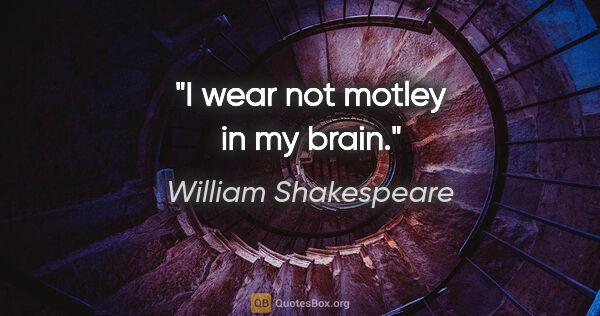Brainly Quotes (page 20)
As to the mouth, it delights at times in laughter; it is disposed to impart all that the brain conceives; though I daresay it would be silent on much the heart experiences. Mobile and flexible, it was never intended to be compressed in the eternal silence of solitude: it is a mouth which should speak much and smile often, and have human affection for its interlocutor.
Charlotte Bronte
You will remember that Albertus Magnus, after describing minutely the process by which spirits may be invoked and commanded, adds emphatically that the process will instruct and avail only to the few - that a man must be born a magician! - that is, born with a peculiar physical temperament, as a man is born a poet. Rarely are men in whose constitution lurks this occult power of the highest order of intellect - usually in the intellect there is some twist, perversity, or disease.' ("The House...
Edward G. Bulwer-Lytton
Prediction in a complex world is a chancy business. Every decision that a survival machine takes is a gamble, and it is the business of genes to program brains in advance so that on average they take decisions that pay off. The currency used in the casino of evolution is survival, strictly gene survival, but for many purposes individual survival is a reasonable approximation.
Richard Dawkins
When women understand that governments and religions are human inventions; that Bibles, prayer-books, catechisms, and encyclical letters are all emanations from the brains of man, they will no longer be oppressed by the injunctions that come to them with the divine authority of *Thus sayeth the Lord.*
Elizabeth Cady Stanton
For the Word of God is not received by faith if it flits about in the top of the brain, but when it takes root in the depth of the heart . . . the heart's distrust is greater than the mind's blindness. It is harder for the heart to be furnished with assurance [of God's love] than for the mind to be endowed with thought.
John Calvin
The forbidden cabinet. The forbidden fruit. That fruit is—a volume, a huge blue-lilac volume with a gold inscription slantwise: Collected Works of A.S. Pushkin. I read the fat Pushkin in the cabinet with my nose in the book and on the shelf, almost in darkness and almost right up against it and even a little bit suffocated by his weight that came right into the throat, and almost blinded by the nearness of the tiny letters. I read Pushkin right into the chest and right into the brain.
Marina Tsvetaeva
As for the story itself, it was entitled "The Dancing Fool." Like so many Trout stories, it was about a tragic failure to communicate. Here was the plot: A flying saucer creature named Zog arrived on Earth to explain how wars could be prevented and how cancer could be cured. He brought the information from Margo, a planet where the natives conversed by means of farts and tap dancing. Zog landed at night in Connecticut. He had no sooner touched down than he saw a house on fire. He rushed into...
Kurt Vonnegut
I keep such music in my brain. No din this side of death could quell; Glory exhulting over pain, And Beauty, garlanded in hell. My dreaming spirit will not heed. The roar of guns that would destroy. My life that on the gloom can read. Proud-surging melodies of joy. To the world's end I went, and found. Death in his carnival of glare; But in my torment I was crowned, And music dawned above despair
Siegfried Sassoon
As Mary delivered what was to be her last lecture about the Galapagos Islands, she would be stopped mid-sentence for five seconds by a doubt which, if expressed in words, might have come out something like this: "Maybe I'm just a crazy lady who had wandered off the street and into this classroom and started explaining the mysteries of life to these people. And they believe me, although I am utterly mistaken about simply everything."She had to wonder, too, about all the supposedly great...
Kurt Vonnegut
That’s what the human brain is there for—to turn the chaos of given experience into a set of manageable symbols. Sometimes the symbols correspond fairly closely to some of the aspects of the external reality behind our experience; then you have science and common sense. Sometimes, on the contrary, the symbols have almost no connection with external reality; then you have paranoia and delirium. More often there’s a mixture, part realistic and part fantastic; that’s religion.
Aldous Huxley
